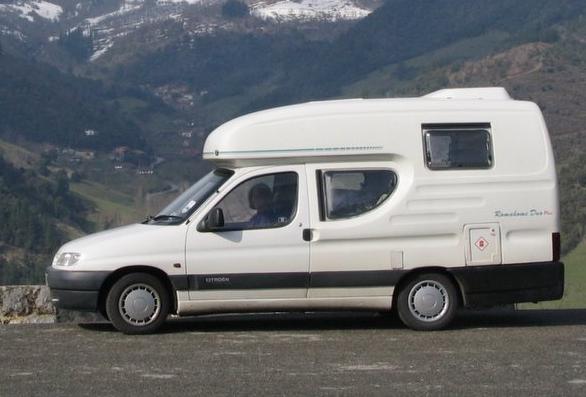As you see, we are finally well and truly over the border making our way towards Dresden by the most direct route – or it would be if we didn't keep discovering interesting things on the way.
We left Furth im Wald around 10am and drove through beautiful countryside along the route of the glassmakers. This follows the border between Germany and the Czech Republic, sometimes coming right up to it before diverting away again. The roads were very empty and the rolling fields of buttercups with forested hillsides and tiny villages nestling in the hollows had an almost fairy tale quality. Later, at Flossenbürg, we discovered a memorial commemorating the deaths of over 30,000 people interned in a nazi concentration camp. To think of such a thing amidst so much beauty was particularly shocking.
At Schönsee we stopped as there was a Waldfest taking place with a street market, a craft fair with wool spinning and wood carving, Bratwurst, Weisswurst and Bratkartoffel cooking in huge containers on the street, accordion playing, the local brass band performing in leather shorts or Dirndls, and a very happy atmosphere being enjoyed by the entire village. After listening to as much oompah music as it is reasonable to expect of anyone who is not German, we walked to the tranquil lake just outside the main town centre. Here we watched a duck proudly taking her nine tiny ducklings for a Sunday morning swim and gazed in fascination at the endless aerial mating dance of a couple of large, beautiful deep turquoise insects over the reeds near a water wheel that generates 12,000 kilowatts of electricity a year from the lake. Later we enjoyed an inexpensive lunch in a cool bar, finding it far too hot and exposed to eat at the fair which would have been more fun.
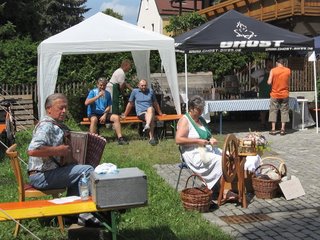 Waldfest, Schönsee
Waldfest, Schönsee 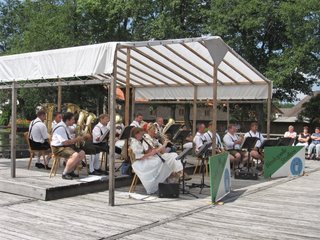 Village band at the Waldfest, Schönsee
Village band at the Waldfest, Schönsee Passing through the little town of Bärnau during the afternoon we discovered the German Button Museum. Apparently in the 1950s the town had over thirty factories turning out buttons faster than you could say Knopf! Now there are less than ten. We have never visited a button museum. Indeed, those of you who know Jill well will be aware that she had a very strong psychological aversion to them and never wears any garment that requires even one. Generally this phobia has not proved a problem in life. It simply makes it impossible to iron shirts or stitch buttons back on! Fortunately Ian is quite capable of doing both. Today though we decided the time had come to face up to this aversion. It really was not a pleasant experience entering the museum where we were given a button each as a souvenir. Ian took both and has hidden them somewhere in Modestine. Hopefully he will throw them away soon.
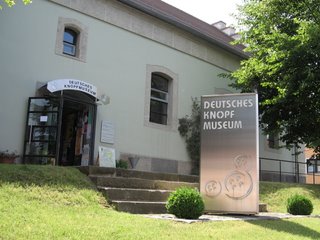 Button Museum, Bärnau
Button Museum, Bärnau Gradually, as we followed the history of button making, it became easier to look at them but quite impossible to touch them. Some were okay. Metal ones were fine and so were many wooden or glass ones. Those made from bone or horn were bad but the very worst were tiny white shirt buttons with four holes in. They made Jill's stomach churn! There is no rational explanation as to why but it has done so for over fifty five years now so there wasn't much hope of a cure this afternoon really. Many buttons were made from sea shells. How the industry developed here we never discovered. It seems strange when this is just about as far from the sea as it is possible to be. Handling the actual shells and the waste bits from around the buttons was perfectly okay, but it was quite impossible to touch the actual buttons produced! Those made from mother of pearl were the worst of all. Weird or what?
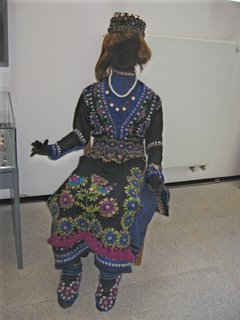 Outfit decorated entirely with buttons, Button Museum, Bärnau
Outfit decorated entirely with buttons, Button Museum, Bärnau 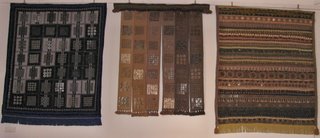 Wallhangings decorated with buttons, Button Museum, Bärnau
Wallhangings decorated with buttons, Button Museum, Bärnau 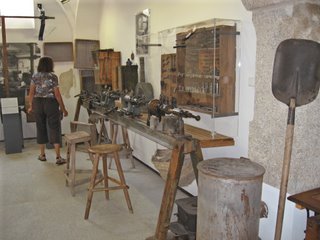 Jill confronts her phobia in the machine room, Button Museum, Bärnau
Jill confronts her phobia in the machine room, Button Museum, Bärnau 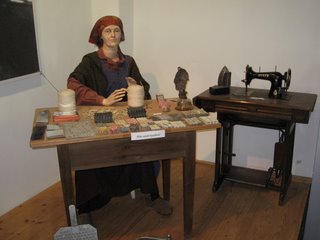 Model of a button sorter, Button Museum, Bärnau
Model of a button sorter, Button Museum, Bärnau 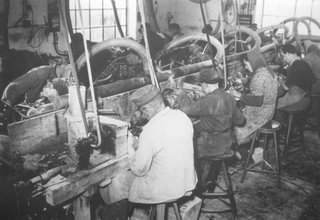 Young and old worked together at the lathe, Button Museum, Bärnau
Young and old worked together at the lathe, Button Museum, Bärnau 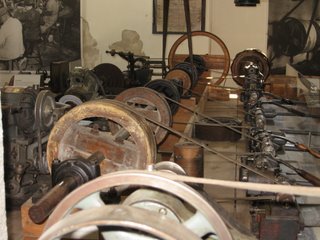 A central drive belt worked several power tools, Button Museum, Bärnau
A central drive belt worked several power tools, Button Museum, Bärnau The lady at the desk asked if we'd like to see a special exhibition of Czech buttons produced 10 kilometres away. We declined. There are only so many buttons a phobic can take in a day and we'd already seen thousands! Some were really beautiful being more like jewellery than a functional item. Their use ranged from boot fastenings to military uniforms and even wall hangings and decorations for clothing. The coat of arms of the town hung on the wall above the entrance was made entirely from buttons and the walls were lined with wooden cabinets, every draw filled with thousands of loose buttons waiting to terrify whoever dared open them.
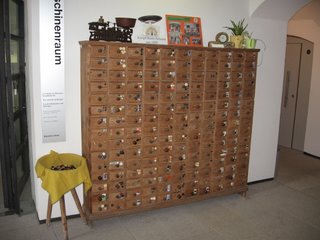 Cabinet filled with loose buttons, Button Museum, Bärnau
Cabinet filled with loose buttons, Button Museum, Bärnau 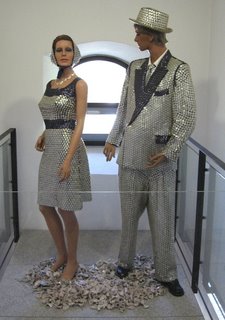 Pearly king and queen of Bärnau, Button Museum, Bärnau
Pearly king and queen of Bärnau, Button Museum, Bärnau 18,000 pearl buttons! Eek!
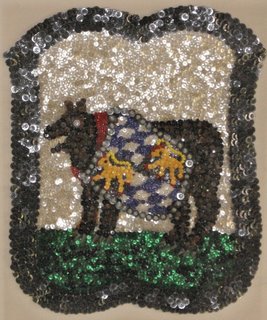 Coat of arms, Button Museum, Bärnau
Coat of arms, Button Museum, BärnauBärnau means Bear meadow
Shortly after leaving the museum our route wound up through hillsides covered in pine forests and we drew off the road to recover from the traumatic experience. Ian made Jill a strong coffee and soon we were on our way again and crossing the border into the Czech Republic. Immediately the roads were potholed and broken, just as in Hungary. As in Hungary and Austria, we had to turn on our headlights in daylight too. It had not been necessary in Germany.
Near the border the roads are even quieter than elsewhere and we had a very pleasant, easy drive to Marienbad except that the signposts started to call it Mariánské Láznê which took us by surprise at the first set of traffic lights.
To Jill's great relief Ian has not undertaken to try to master the language and we seem to be coping perfectly well in German. We got out 600 koruna from our bank account with little idea as to its value. It seems to be worth about £15 and most of it has gone on a couple of bags of peanuts and the camp site fees. Food and drink prices seem to be much as in Hungary which is considerably less than in Austria and Germany.
In Marienbad we parked and spent an hour or so exploring the town which really seems very pleasant. It is a typical spa town with many hotels and guest houses for those taking the waters. There is a large, shady and attractively laid-out park with bright beds of flowers and huge cascading fountains. Architecturally the buildings are an eclectic mix of styles dating from the late 19th century with elaborate balconies and huge caryatids holding up pillars on the facades. There is also some unfortunate evidence of Socialist architecture in rusting reinforced concrete and several harsh statues and monuments. Generally though, we liked the town very much.
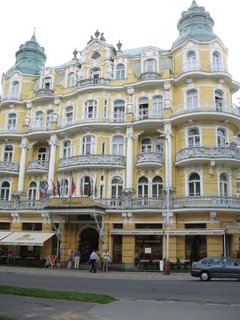 Extravagant hotel architecture, Marienbad
Extravagant hotel architecture, Marienbad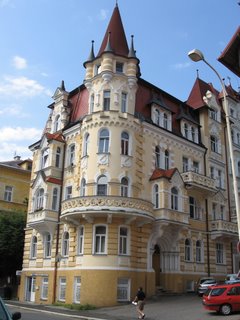 Nineteenth century villa, Marienbad
Nineteenth century villa, MarienbadCamp sites are few and far between around here. We discovered this one a few kilometres outside of the town and although it is passable, it is not very nice. Compared with the site we had in Furth im Wald, which cost much the same, it offers very poor value for money. Still it's only for one night.
Monday 10th July 2006, Freiberg, near Dresden, Germany
Last night's campsite really was not very pleasant at all. It was a legacy from socialist times and little effort had been made to modernise it since. The plumbing was poor and the drains blocked with people's hair, there was communal loo paper so you needed to work out how much you needed before disappearing into the cubicle, and the walls of the shower block were lined with asbestos. We were glad to leave and eager not to test out another Czech campsite this evening.
Needing bread and other foodstuffs we drove back into Marienbad and got out some more koruna from the bank. We also tried to send another blog page but the server was temporarily down. Still, the man in the internet shop spoke some English, was intrigued with our blogsite and even obligingly wrote down how to say please and thank you in Czech for us.
We discovered there was far more to the town than we realised last night. Today we found the thermal baths and health treatment rooms. The wonderful, 19th century buildings are set in beautiful gardens where the benches were lined with people drinking cups of spring water. We tried some ourselves and found it disgusting. Imagine water removed from the inside of a very rusty drainpipe with fizz added. People were filling bottles to take away with them and the contents looked a faint shade of orange.
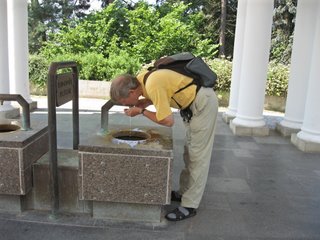 Ian samples the waters, Marienbad
Ian samples the waters, Marienbad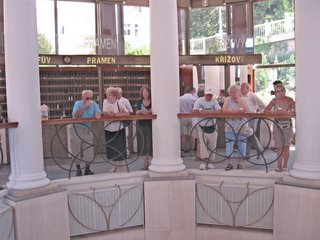 Jill joins the curists in the pump house, Marienbad
Jill joins the curists in the pump house, MarienbadWe have reservations about spas and cures. They seem to have been set up specially for German tourists of retirement age who seem very conscious about their health so long as it does not stand in the way of heavy smoking, beer drinking and cream cake eating. Many are sent for a cure on their health insurance. The treatment day appears to start with a drink from the fountain, followed by immersion, underwater massage, a pedicure and a trip to the hairdresser. The rest of the day can then safely be spent on terraces with beers or milky coffees to drink and large lunches followed by ice creams and sticky cakes. Most curists we have seen looked overweight and unfit. The most exercise they got was a slow stroll through the park.
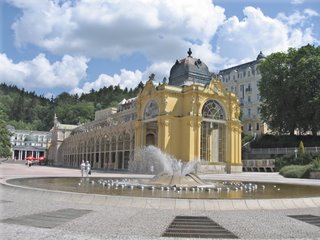 Arcade and fountain in the spa gardens, Marienbad
Arcade and fountain in the spa gardens, Marienbad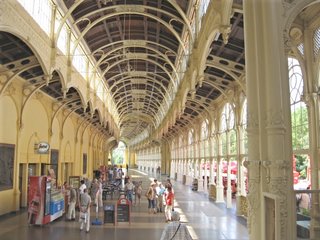 Interior of the arcade, Marienbad
Interior of the arcade, Marienbad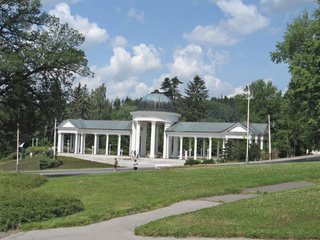 Colonnade in the spa gardens, Marienbad
Colonnade in the spa gardens, MarienbadAll this treatment takes place in opulent pseudo-hospitals or clinics for those with more wealth than health. Here appointments are made with people designated as doctors or nurses dressed in white uniforms and with brass nameplates on the doors. The busiest place in town is the pharmacy attached to the spa complex with long queues of patients waiting for their prescriptions to be processed.
These buildings are wonderful. Even in socialist times they must have been well cared for to encourage the rich to spend time and money here. We decided to see how far we could get before anyone stopped us. In the event nobody did. We were welcomed to the spa by a smiling doorman and we walked through marble halls with gold moulding on the ceiling, immaculately clean foyers and corridors, original oil paintings, thick carpets and plush furnishings. We wandered through the restaurant and the casino taking photos as we went, searching for the personal library of England's own King Edward VII who was a regular visitor to Marienbad and met the Emperor Franz Joseph here. The library door was locked when we found it but it didn't matter as it was really to provide a good excuse if anyone stopped us.
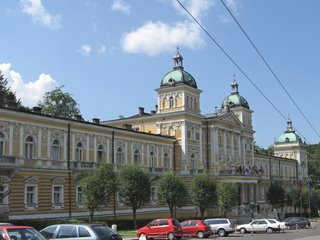 Spa Hotel and Casino, Marienbad
Spa Hotel and Casino, Marienbad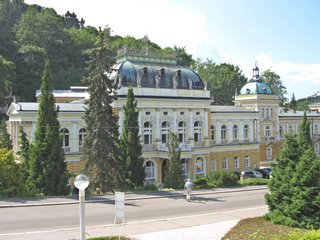 Spa treatment centre, Marienbad
Spa treatment centre, Marienbad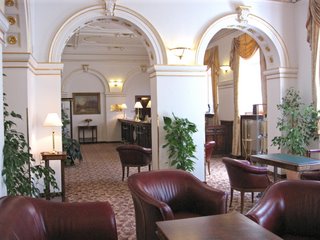 Reception area, Spa Hotel, Marienbad
Reception area, Spa Hotel, Marienbad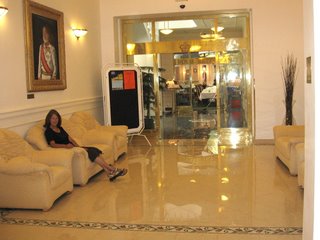 Edward VII, Spa Hotel, Marienbad
Edward VII, Spa Hotel, Marienbad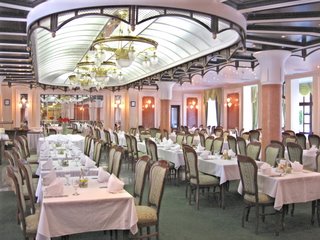 Royal Restaurant, Spa Hotel, Marienbad
Royal Restaurant, Spa Hotel, Marienbad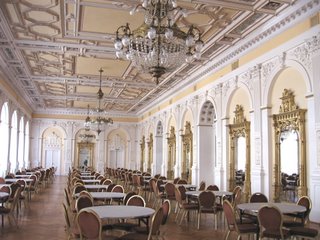 In the Casino, Spa Hotel, Marienbad
In the Casino, Spa Hotel, MarienbadOur morning had been really interesting watching how seriously everyone took the Spa Experience and we had wallowed in a sense of luxury. To round it off we lunched at the Wiener Café attached to the spa and overlooking the park. It was one of the very smartest places in town but our light lunch with large coffees cost less than £5 for the two – paying in koruna, in euros prices are generally half as much again.
The local library gave us internet access after lunch and we were finally able to load on our recent blog. The librarian was friendly and laughed when we took out our piece of paper and read out the "thank you" translation we'd been given earlier. One can get by quite well without real language communication. Generally we have managed well in eastern Europe using German. People generally assume that English is really widely used but this has not been our experience. Indeed we have very rarely met anyone who speaks English and outside of tourist meccas we have met no English people. On the other hand, everyone assumes we are German. Even the Chinese lady in the supermarket used German to us.
Marienbad has been a wonderful experience and we are delighted that we went back to see it in more detail today. Once we left it we have spent the day driving north east along quite steep winding roads through wooded countryside and across open plateaux. The sun has been bright and hot and there has been little shade. At a village garage we used up most of our remaining koruna buying enough diesel to get us back into Germany. Then, just before we reached the frontier, we passed a Chinese shanty town selling a garish assortment of garden gnomes, stone ornaments, beer, soft drinks, clothes, shoes, cheap jewellery and car accessories. As we still had nearly a whole pound in korunas we stopped to take a look. The Chinese vendors were falling over themselves for our custom, almost demanding that we go into their little shacks to see their cigarettes, sweets and pirated videos. Useless to say no. They insisted on showing us their goods and even ran after us as we walked on. Not wanting anything, we gave our remaining money to a quiet chinaman with a couple of delightful little boys playing with a water hose, saying it was no use to us in Germany and to give it to his children. He seemed touched and although we said no, he insisted we took a bottle of his beer in exchange! So we now have some Chinese Czech beer cooling off in Modestine's fridge.
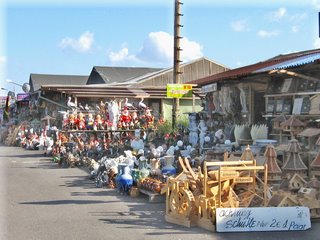 Chinese junk moored on the Czech-German border
Chinese junk moored on the Czech-German border Chinese children help dad on his stall near the Czech-German border
Chinese children help dad on his stall near the Czech-German borderWe went into the Czech Republic yesterday from West Germany. After travelling through the country for several hours today we returned back into Germany, but this time into the former DDR. With seventeen years for the country to reunite you would imagine there would be little difference between the two parts. It is however almost a different country and has far more in common with its former socialist neighbours than with western Germany. It appears rather run down with broken tarmac on the roads and a very low density of population. Employment opportunities are fewer and salaries are still far lower than in the more affluent west. Anyone with a skill has left the area and made a new and better life in the western part.
A serious accident on the road ahead of us sent us on a very long Umleitung along pitted roads at least as bad of those in the Hortobagy of Hungary. Germany seems to have more and bigger Umleitungen or traffic diversions than most other countries we have visited - though France is pretty bad too.
By the time we were back on our route again we had by-passed the only likely place to find a campsite before reaching Dresden and it was beginning to get late. Nearing Freiberg we were relieved to see a camping sign directing us down a by-road. It took ages to find and required the help of several local residents but we are finally settled on an almost deserted and very basic site in a clearing in a pine forest beside a lake. The woods are full of tiny frogs making their first visit to dry land after being tadpoles. They are so tiny and there are hundreds of them on the woodland path between where we have parked Modestine and the shower block. We will shortly venture out together to the loos with our torch hoping we don't tread on too many of them on the way. Several thrushes have been hopping around with frogs dangling from their beaks.
As we sat in the last of the evening sunlight someone came down the woodland path on his mountain bike. Seeing us he diverted into the clearing and asked us about Modestine. This is still happening daily but the novelty of mentioning it has worn thin. This man though was very friendly and chatty. It gave Ian excellent German practice and once his curiosity had been satisfied he became very talkative about the town of Freiberg where he works in the Institute of Fuel Technology. He even offered to show us around tomorrow! He has given us details of the best towns and places to visit in the north of the former DDR area and, once he realised Ian had a friend in Weimar and had known this area before German reunification, he spent some time discussing German politics and the social and economic problems that still separate the two parts in so many ways. He was a really pleasant, friendly person and we very much enjoyed meeting him. We have however declined his kind offer to show us the town tomorrow as we are anxious to move on and only stopped here from necessity overnight.
